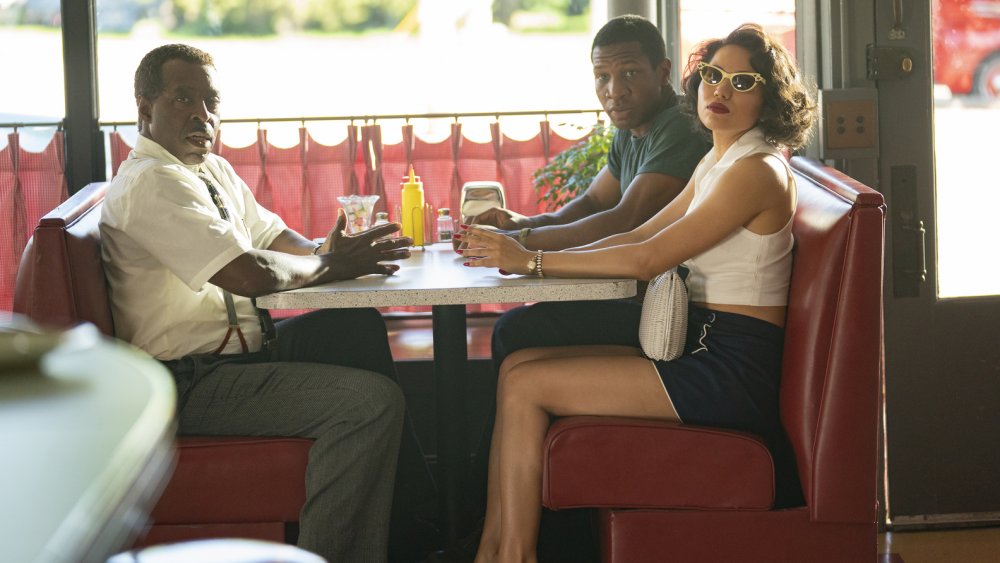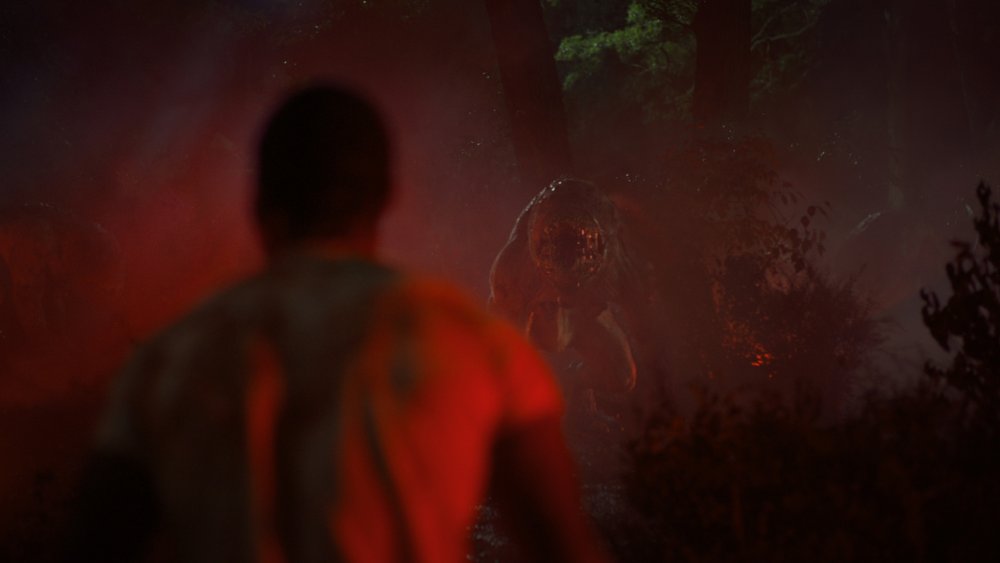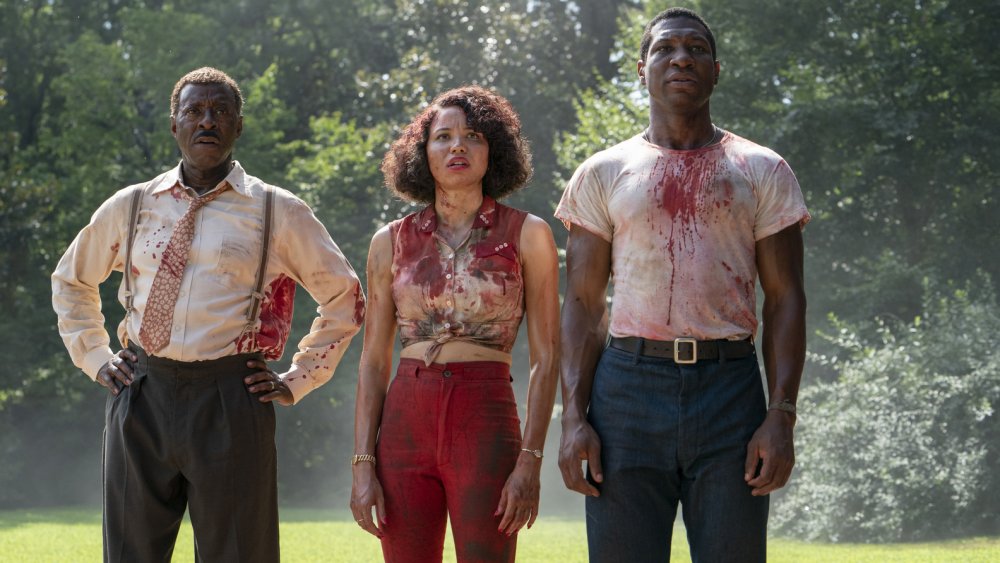How Lovecraft Country Tackles A Complicated Horror History
You might not know her face since she works from behind the scenes, but you definitely know the projects she's been a part of. Sons of Anarchy, Heroes, and Spartacus are just some of the writing credits she has on her résumé, and she's also been a producer on shows like SyFy's Helix and WGN's Underground. Now, writer-producer Misha Green has added another impressive title to her body of work: She's currently the showrunner of HBO's latest sensation Lovecraft Country.
Based on the novel by Matt Ruff, Lovecraft Country is a pulpy horror-fantasy family drama tale that follows Atticus Freeman (Jonathan Majors) as he tries to piece together his family's lineage while maneuvering through a segregated 1950s America and encountering monsters (of both the supernatural and human kind) along the way. In short, Lovecraft Country is a unique beast — a genre mashup of epic proportions that tackles relevant topics. Thus, it's no surprise that Ruff's book caught Green's eye and attracted the attention of two Hollywood juggernauts: Jordan Peele (Get Out, Us) and J.J. Abrams (Lost, Westworld), who both serve as executive producers.
Looper recently took part in a virtual roundtable interview with Green, during which she was asked about how Peele and Abrams ultimately joined along for a ride through Lovecraft Country, as well as how the series handles the complicated history of author H.P. Lovecraft, the man who ultimately inspired Ruff's novel.
Misha Green learned a great deal from Lovecraft Country executive producers Jordan Peele and J.J. Abrams
"Jordan and I met and talked about this project very, very early on. It was during season 2 of Underground for me, and he was just making Get Out," said Green as she discussed her first early meeting with Peele.
Like the rest of us, Green wasn't aware that Peele was about to reveal himself as a new, unexpected master of horror. At the time, Peele was mostly known for comedy, so when an opportunity to meet with Peele presented itself, Green was initially hesitant. "They were like, 'Oh, you should meet Jordan Peele.' I was like, 'I don't like to laugh — I don't know why — what do we have to talk about?'" she admitted.
Her worries were quickly laid to rest, and when she and Peele met up, they clicked instantly and bonded over horror. "They were like, 'He's a huge horror fan, don't worry.' We got together and we totally vibed. He was like, 'Come watch Get Out.' I watched Get Out, I was like, 'Oh my God, this is amazing,'" Green shared. "This idea that horror is the metaphor for the emotional thing for the truth, is a thing we were both playing with at the time. So that's why we vibed."
Meanwhile, Abrams was busy making, as Green puts it, "a little Star Wars movie" at the time. Still, the knowledge he possessed played a crucial role in fine-tuning the overall broad scope of Lovecraft Country and bringing its monsters to life.
"The thing that J.J. really helped me with is opening this world of bigger-budget filmmaking and world-building," said Green. "He was pointing the way, saying, 'This is the VFX house you should use. This is the VFX guy. This is how you should understand and think about how you're creating these monsters.'"
While their participation and words of wisdom were clearly invaluable to Green, she did reveal that Peele and Abrams never really set foot on set. She noted, "For both of them, [while] they weren't on the ground, they were providing the cover for me to play around in this world — which would have never been possible had Get Out not existed, had J.J. not been J.J. and created Bad Robot and all that stuff."
Misha Green confronts the controversial legacy of influential author H.P. Lovecraft
While Green had Peele and Abrams in the wings helping aid in making Lovecraft Country a reality, the showrunner also had to do a deep dive into H.P. Lovecraft's history. Lovecraft was an influential writer who single-handedly created the "Lovecraftian horror" genre (also known as cosmic horror), and he's considered to be an influence on many major Hollywood films including Alien, The Thing, and The Mist. Throughout the years, there have also been many movies based on Lovecraft's stories. As creatively inspiring as Lovecraft's works were, however, it's been well-documented that he was a racist.
Green is a big horror fan — that much is apparent throughout Lovecraft Country's 10-episode run — but she refuses to turn a blind eye to Lovecraft's bigotry, and rightfully so.
"I was familiar with Lovecraft because I'm such a horror fan. I had read his stories before, and I was familiar with his history as a racist as well," she said. "So, I had never been like, 'Oh my God, Lovecraft is amazing.' But you can see where he influenced so much of the genre."
While many are conflicted about simultaneously enjoying Lovecraft's works and disagreeing with the things he said and did during his life, there's no denying that Ruff's book uses Lovecraft's writings as inspiration to tell a new story with a positive message. Lovecraft Country the series pays homage to the author — but, more importantly, it shines a light on Lovecraft's racist behaviors and uses that negativity to teach valuable lessons that will resonate with today's audiences.
"I think that's one of the things that was exciting about Matt's book, too, was this idea of reclaiming and honoring the contributions [Lovecraft] made to the genre, but not pretending that he wasn't a massive racist," Green noted. "In his texts, when you read Lovecraft, you can't pretend you don't see it. So, it felt like a move forward. That's what we want to do with this show as a whole is to pay homage and then go, 'How do we build upon that and make it feel like Lovecraft Country and also contribute to this genre that we love so much?'"
The next episode of Lovecraft Country will premiere on Sunday, August 23 at 9 PM ET on HBO. New episodes air each Sunday.


